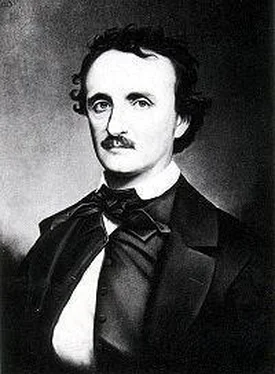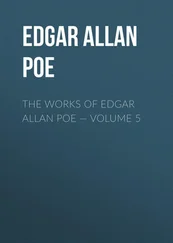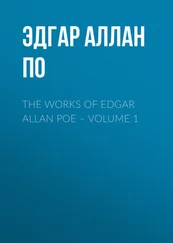Эдгар По - Works of Edgar Allan Poe
Здесь есть возможность читать онлайн «Эдгар По - Works of Edgar Allan Poe» весь текст электронной книги совершенно бесплатно (целиком полную версию без сокращений). В некоторых случаях можно слушать аудио, скачать через торрент в формате fb2 и присутствует краткое содержание. Жанр: Старинная литература, на английском языке. Описание произведения, (предисловие) а так же отзывы посетителей доступны на портале библиотеки ЛибКат.
- Название:Works of Edgar Allan Poe
- Автор:
- Жанр:
- Год:неизвестен
- ISBN:нет данных
- Рейтинг книги:4 / 5. Голосов: 1
-
Избранное:Добавить в избранное
- Отзывы:
-
Ваша оценка:
- 80
- 1
- 2
- 3
- 4
- 5
Works of Edgar Allan Poe: краткое содержание, описание и аннотация
Предлагаем к чтению аннотацию, описание, краткое содержание или предисловие (зависит от того, что написал сам автор книги «Works of Edgar Allan Poe»). Если вы не нашли необходимую информацию о книге — напишите в комментариях, мы постараемся отыскать её.
Works of Edgar Allan Poe — читать онлайн бесплатно полную книгу (весь текст) целиком
Ниже представлен текст книги, разбитый по страницам. Система сохранения места последней прочитанной страницы, позволяет с удобством читать онлайн бесплатно книгу «Works of Edgar Allan Poe», без необходимости каждый раз заново искать на чём Вы остановились. Поставьте закладку, и сможете в любой момент перейти на страницу, на которой закончили чтение.
Интервал:
Закладка:
"With a murmurous stir uncertain, in the air, the purple curtain Swelleth in and swelleth out around her motionless pale brows,"
found an echo in these:
"And the silken sad uncertain rustling of each purple curtain Thrilled me--filled me with fantastic terrors never felt before."
Here Poe assumed a privilege for which he roughly censured Longfellow, and which no one ever sought on his own premises without swift detection and chastisement. In melody and stanzaic form, we shall see that the two poems are not unlike, but in motive they are totally distinct. The generous poetess felt nothing but the true originality of the poet. "This vivid writing!" she exclaimed,--"this power which is felt!... Our great poet, Mr. Browning, author of 'Paracelsus,' &c., is enthusiastic in his admiration of the rhythm." Mr. Ingram, after referring to "Lady Geraldine," cleverly points out another source from which Poe may have caught an impulse. In 1843, Albert Pike, the half-Greek, half-frontiersman, poet of Arkansas, had printed in "The New Mirror," for which Poe then was writing, some verses entitled "Isadore," but since revised by the author and called "The Widowed Heart." I select from Mr. Pike's revision the following stanza, of which the main features correspond with the original version:
"Restless I pace our lonely rooms, I play our songs no more, The garish sun shines flauntingly upon the unswept floor; The mocking-bird still sits and sings, O melancholy strain! For my heart is like an autumn-cloud that overflows with rain; Thou art lost to me forever, Isadore!"
Here we have a prolonged measure, a similarity of refrain, and the introduction of a bird whose song enhances sorrow. There are other trails which may be followed by the curious; notably, a passage which Mr. Ingram selects from Poe's final review of "Barnaby Rudge":
"The raven, too, * * * might have been made, more than we now see it, a portion of the conception of the fantastic Barnaby. * * * Its character might have performed, in regard to that of the idiot, much the same part as does, in music, the accompaniment in respect to the air."
Nevertheless, after pointing out these germs and resemblances, the value of this poem still is found in its originality. The progressive music, the scenic detail and contrasted light and shade,--above all, the spiritual passion of the nocturn, make it the work of an informing genius. As for the gruesome bird, he is unlike all the other ravens of his clan, from the "twa corbies" and "three ravens" of the balladists to Barnaby's rumpled "Grip." Here is no semblance of the cawing rook that haunts ancestral turrets and treads the field of heraldry; no boding phantom of which Tickell sang that, when,
"shrieking at her window thrice, The raven flap'd his wing, Too well the love-lorn maiden knew The solemn boding sound."
Poe's raven is a distinct conception; the incarnation of a mourner's agony and hopelessness; a sable embodied Memory, the abiding chronicler of doom, a type of the Irreparable. Escaped across the Styx, from "the Night's Plutonian shore," he seems the imaged soul of the questioner himself,--of him who can not, will not, quaff the kind nepenthe, because the memory of Lenore is all that is left him, and with the surcease of his sorrow even that would be put aside.
The Raven also may be taken as a representative poem of its author, for its exemplification of all his notions of what a poem should be. These are found in his essays on "The Poetic Principle," "The Rationale of Verse," and "The Philosophy of Composition." Poe declared that "in Music, perhaps, the soul most nearly attains the great end for which, when inspired by the Poetic Sentiment, it struggles--the creation of supernal Beauty.... Verse cannot be better designated than as an inferior or less capable music"; but again, verse which is really the "Poetry of Words" is "The Rhythmical Creation of Beauty,"--this and nothing more. The tone of the highest Beauty is one of Sadness. The most melancholy of topics is Death. This must be allied to Beauty. "The death, then, of a beautiful woman is, unquestionably, the most poetical topic in the world,--and equally is it beyond doubt that the lips best suited for such a topic are those of a bereaved lover." These last expressions are quoted from Poe's whimsical analysis of this very poem, but they indicate precisely the general range of his verse. The climax of "The Bells" is the muffled monotone of ghouls, who glory in weighing down the human heart. "Lenore," The Raven , "The Sleeper," "To One in Paradise," and "Ulalume" form a tenebrose symphony,--and "Annabel Lee," written last of all, shows that one theme possessed him to the end. Again, these are all nothing if not musical, and some are touched with that quality of the Fantastic which awakes the sense of awe, and adds a new fear to agony itself. Through all is dimly outlined, beneath a shadowy pall, the poet's ideal love,--so often half-portrayed elsewhere,--the entombed wife of Usher, the Lady Ligeia, in truth the counterpart of his own nature. I suppose that an artist's love for one "in the form" never can wholly rival his devotion to some ideal. The woman near him must exercise her spells, be all by turns and nothing long, charm him with infinite variety, or be content to forego a share of his allegiance. He must be lured by the Unattainable, and this is ever just beyond him in his passion for creative art.
Poe, like Hawthorne, came in with the decline of the Romantic school, and none delighted more than he to laugh at its calamity. Yet his heart was with the romancers and their Oriental or Gothic effects. His invention, so rich in the prose tales, seemed to desert him when he wrote verse; and his judgment told him that long romantic poems depend more upon incident than inspiration,--and that, to utter the poetry of romance, lyrics would suffice. Hence his theory, clearly fitted to his own limitations, that "a 'long poem' is a flat contradiction in terms." The components of The Raven are few and simple: a man, a bird, and the phantasmal memory at a woman. But the piece affords a fine display of romantic material. What have we? The midnight; the shadowy chamber with its tomes of forgotten lore; the student,--a modern Hieronymus; the raven's tap on the casement; the wintry night and dying fire; the silken wind-swept hangings; the dreams and vague mistrust of the echoing darkness; the black, uncanny bird upon the pallid bust; the accessories of violet velvet and the gloating lamp. All this stage effect of situation, light, color, sound, is purely romantic, and even melodramatic, but of a poetic quality that melodrama rarely exhibits, and thoroughly reflective of the poet's "eternal passion, eternal pain."
The rhythmical structure of The Raven was sure to make an impression. Rhyme, alliteration, the burden, the stanzaic form, were devised with singular adroitness. Doubtless the poet was struck with the aptness of Miss Barrett's musical trochaics, in "eights," and especially by the arrangement adopted near the close of "Lady Geraldine":
"'Eyes,' he said, 'now throbbing through me! Are ye eyes that did undo me? Shining eyes, like antique jewels set in Parian statue-stone! Underneath that calm white forehead, are ye ever burning torrid O'er the desolate sand-desert of my heart and life undone?'"
His artistic introduction of a third rhyme in both the second and fourth lines, and the addition of a fifth line and a final refrain, made the stanza of The Raven . The persistent alliteration seems to come without effort, and often the rhymes within lines are seductive; while the refrain or burden dominates the whole work. Here also he had profited by Miss Barrett's study of ballads and romaunts in her own and other tongues. A "refrain" is the lure wherewith a poet or a musician holds the wandering ear,--the recurrent longing of Nature for the initial strain. I have always admired the beautiful refrains of the English songstress,--"The Nightingales, the Nightingales," "Margret, Margret," "My Heart and I," "Toll slowly," "The River floweth on," "Pan, Pan is dead," etc. She also employed what I term the Repetend, in the use of which Poe has excelled all poets since Coleridge thus revived it:
Читать дальшеИнтервал:
Закладка:
Похожие книги на «Works of Edgar Allan Poe»
Представляем Вашему вниманию похожие книги на «Works of Edgar Allan Poe» списком для выбора. Мы отобрали схожую по названию и смыслу литературу в надежде предоставить читателям больше вариантов отыскать новые, интересные, ещё непрочитанные произведения.
Обсуждение, отзывы о книге «Works of Edgar Allan Poe» и просто собственные мнения читателей. Оставьте ваши комментарии, напишите, что Вы думаете о произведении, его смысле или главных героях. Укажите что конкретно понравилось, а что нет, и почему Вы так считаете.












